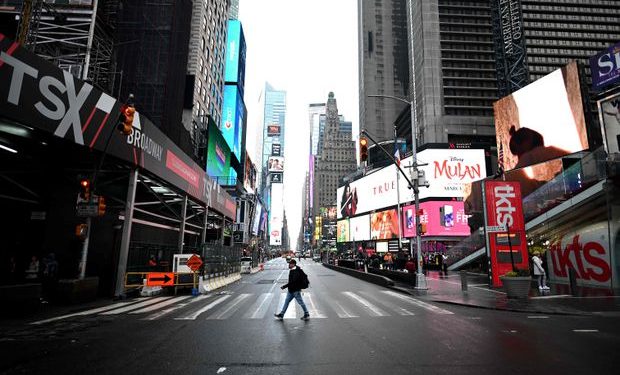Ian Goldin and Robert Muggah
No city has escaped the deadly spread of Covid-19. But the virus has had a profoundly uneven impact on different groups of people even within the same city. When New York City was the global epicentre of the pandemic, downtown Manhattan had an infection rate of roughly 925 per 100,000, compared to 4,125 per 100,000 in Queens. The reason for this gap is straightforward: New York’s wealthiest residents could access a wide range of health services and work remotely in spacious multi-story buildings.
As in every big city, one’s post code profoundly shapes one’s destiny. Manhattan and Queens are less than 25 minutes apart by subway, but the difference between them in annual median income is a staggering $78,000; and the variation in life expectancy between the city’s boroughs can be as high as ten years. Similar inequalities in income, health, education, and virtually every other metric of wellbeing persist in most metropolises around the world. Covid-19 will widen these disparities further.
Around the world, it is not so much densely populated cities as overcrowded, marginalised neighborhoods that are struggling to contain the spread of Covid-19. Socioeconomic factors, not physical geography, are a key determinant of contagion risk, particularly in the built-up areas of developing countries. For example, it is estimated that over half of Mumbai’s seven million slum-dwellers already have Covid-19. And in South Africa, where five million households do not have a refrigerator, barely 46 per cent have access to a flush toilet in their homes and a one-third share toilets with other families – it is not surprising that new infections soared despite drastic lockdown measures.
The pandemic is especially harmful for urbanites in the informal economy, where most jobs are low-paid and cannot be performed remotely. Whereas 47 per cent of college graduates could work remotely in the United States in July, only 4 per cent of those without a high school diploma were able to do so. While this dynamic certainly hurts the urban poor in cities like New York, it is even more debilitating for those in, say, Dhaka, where over 80 per cent of workers depend on the informal sector – the development organisation BRAC reports that 62 per cent of all daily wage income essentially disappeared in June.
As we show in our new book Terra Incognita, Covid-19 is exacerbating multiple forms of inequality within and between countries and cities, and raising fundamental questions about the future of urban living. Major cities are bearing the brunt of the pandemic’s human and economic costs – and the worst is yet to come – fueling concerns about whether they will survive as the central nodes of the global economy.
But while the pandemic has severely affected many superstar cities, some of the industries driving their economies are remarkably resilient, which may help to explain why global stock markets have bounced back. It is clear that the biggest winner in the current crisis will be Big Tech. On the same day that US economic growth was reported to have fallen by 32.9 per cent (July 31), Amazon reported quarterly profits of $5.2 billion, with sales up 40 per cent from the previous year. Similarly, Google, Apple, and Facebook have all performed far better than the economy as a whole during the pandemic.
Even if a vaccine is developed and distributed as early as 2021, Covid-19 will be tremendously disruptive to cities. Nicholas Bloom of Stanford University predicts that if cities lose the office space previously used by knowledge workers, urban expenditures overall could drop by one-third. The dramatic decline in property taxes and other revenue streams will seriously compromise municipal governments’ ability to provide basic services. The exodus of high-value workers will have dangerous ripple effects on city residents – from waiters and actors to grocers and retailers. These people and services give cities much of their character, and their loss would accelerate the downward spiral.
Still, while many major cities are down, they are far from out. The death of the superstar city has been predicted before, yet urban areas have always demonstrated an extraordinary capacity to bounce back, including from pandemics and plagues. Even in the most adverse conditions, large, medium, and smaller cities remain the most desirable places to live, work, and play, and urban dwellers are healthier and wealthier than their rural counterparts, on average. This is unlikely to change, despite the acceleration of remote working.
Cities will continue to be sites for innovation, experimentation, and invention. With many countries now facing the second wave of Covid-19 (or still caught in the first), mayors are rethinking their strategies to improve affordability, promote cleanliness, ensure stable supply chains, produce energy, and reduce congestion. Precisely because cities face tremendous financial shortfalls and growing liabilities, they will need to draw on their exceptional creativity to do more with less. Rather than being an existential threat to cities, Covid-19 may lead to a more advanced and inclusive urbanism in some parts of the world.
One way or another, our future lies in cities. This is why the World Economic Forum has focused its Great Reset initiative on urban hubs, and why the UN Secretary-General António Guterres has put resilient and inclusive cities at the center of achieving the Sustainable Development Goals. For city leaders, the task is to start investing in micro-mobility and pedestrianisation, while testing new models of urban design, including retrofitting buildings and public spaces with healthier renewable alternatives. The pandemic has shown us that ensuring a healthy population requires reshaping society. Cities are where that process will start.
Ian Goldin is Professor of Globalisation and Development at the University of Oxford. Robert Muggah is a member of the World Economic Forum’s Global Future Council on Cities and Urbanisation and an adviser to the Global Risks Report. @Project Syndicate.






































